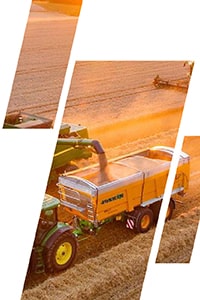Finalising your subscription
To validate your subscription, please enter the 6-digit code that we have just sent you by e-mail.
JOSKIN offers single-circuit hydraulic brakes as an option for its vehicles. With this system, the braking power depends on the amount of pressure applied to the brake control pedal. Although hydraulic braking is still the most common system in the world, it is being phased out in the European Union in favour of double-circuit air brakes, which are approved under Mother Regulation EU 167/2013.
JOSKIN equips its vehicles with double-circuit air brakes (red and yellow hoses) as standard. This assembly includes a compressed air tank as well as a brake regulator with 3 positions (loaded, half-loaded and empty). Before moving the machine, the driver manually selects the desired braking intensity according to the load being transported. As an option, it is possible to choose an automatic regulator that takes the loading degree into account and adapts the braking power. It is also possible to equip these brakes with the accessories necessary to comply with the European certification according to the EU 167/2013 standard, also known as "Mother Regulation". Although less and less in demand as it is mainly fitted to machines pulled by older tractors, single-circuit air brakes (black hose) can also be fitted to JOSKIN vehicles instead of the double-circuit version.
The combination of single-circuit hydraulic brakes and double-circuit air brakes on the same machine is of course possible. The vehicle can be hitched to tractors equipped with either of these two systems. This option is therefore ideal for farms or agricultural co-operatives with a fleet of different tractors. The brake system that is not in use simply remains disconnected from the tractor. Despite the interest in this system in many European countries, it is however prohibited by the EU 167/2013 standard (Mother Regulation), and can therefore not be certified in the 27 member states of the European Union.